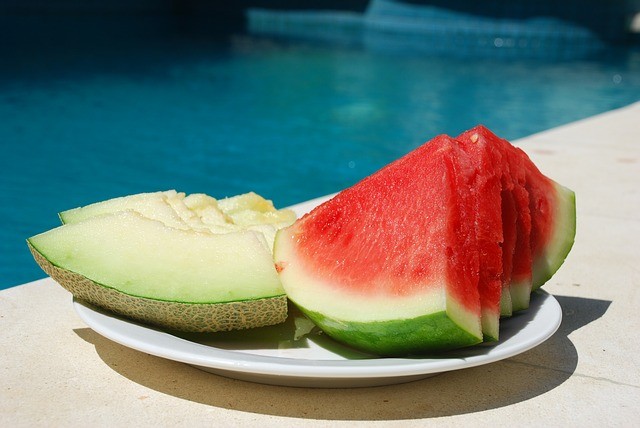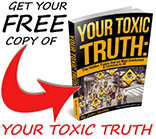Read on to find out the kind of watermelon that you should never eat. Check out the article we found over at Healthy Food House.
Did you know that watermelon seeds in China, eastern China particularly are covered in exploded fruit? Growth chemicals are used in order to make crops much bigger. However, farmers do not quite get the results they expect – crops end up destroyed.
Forchlorfenuron, a growth accelerator, to increase the size of their watermelons. Even melons that survive the chemical treatment tend to give fibrous, misshapen fruit. Most of the seeds in these melons are white instead of black.
According to MSNBC:
“Chinese regulations don’t forbid use of the substance. It is also allowed in the United States for use on kiwi fruit and grapes … About 20 farmers and 115 acres of watermelon around Danyang were affected … Farmers resorted to chopping up the fruit and feeding it to fish and pigs.”
It may sound like a joke to you, but it is pretty real. Forchlorfenuron is implicated in the so-called “exploding melon” phenomenon.
Forchlorenuron
It is a “plant growth regulator,” and in 2004 it was registered with the US Environmental Protection Agency (EPA) for use on raisins, grapes, and kiwi fruits. As explained in the EPA Pesticide Fact Sheet, farmers apply the chemical to the flowers and/or developing fruits during early post-bloom stage to increase fruit size, fruit sed, cluster weight, and cold storage. The sheet explains that forchlorfenuron “acts synergistically with natural auxins to promote plant cell division and lateral growth.”
As MSNBC explained, Chinese farmers apply the chemical “during overly wet weather and… too late in the season, which made the melons burst,” which is totally wrong.
Yes, that is true. Melons explode by the acre.
An article published on May 24, by The Epoch Times, revealed that the seeds were actually “quality watermelon seeds,” that were imported from Japan. Only 10 of the 20 farmers in the affected Chinese fields used imported seeds. However, it is still not clear whether all farmers with bad crops had used forchlorfenuron.
These ruptured melons are not the most concerning issue of this story. What about consumer safety. Even though no specific health hazards were covered in these articles, they sure allude that there are possible health concerns.
Are growth promoting chemicals safe to eat?
According to MSNBC:
“The report quoted Feng Shuangqing, a professor at the China Agricultural University, as saying the problem showed that China needs to clarify its farm chemical standards and supervision to protect consumer health. the report underscores how farmers in China are abusing both legal and illegal chemicals, with many farms misusing pesticides and fertilizers.”
Unfortunately, forchlorfenuron is legal in both China and the US. But, you probably wonder whether it should be. As explained in the EPA pesticide fact sheet, the chemical is not harmless to environment or animals, and possibly humans. Animal studies have shown certain side-effects, including:
- Increased incidence of alopecia (hair loss)
- Decrease in birth weight
- Increased mortality in pups
- Decrease in litter sizes
Forchlorfenuron was also characterized like “moderately toxic to freshwater fish on an acute basis.”
How to spot fruits frown with such chemicals?
The most common indicator that fruits or veggies have been “flavored” with some chemicals is their lack of flavor. They may look plump and fully ripe, but the flavor sure lacks.
These happens because growth enchancers stimulate cell division and fruits grow faster, so the chemical drains them of flavor. If you think better, this is quite logical. Flavor indicates ripeness, which comes with time. Unripe fruits and veggies are tasteless.
Treated watermelons are large and have a brightly colored surface, but the color of their meaty part is more white than red. These watermelons have white seeds and fibrous, misshapen fruit. This applies to regular watermelons with black seeds. Seedless varieties have tiny white seeds.
Conclusion
Organic is better even though it costs much more, but it will sure safe you some money in future, that you would otherwise spend on healing yourself if you prefer to buy whatever comes to your hand. Invest a bit more and avoid paying large medical bills later in life.
This will keep you safe from physical and mental disability and dysfunction that occur as a result of an unhealthy lifestyle.
Do not let labels mislead you. Learn more about what to look for, talk to local farmers and share this info with your loved ones, friends and pretty much everyone you know. Eventually, you will help the movement toward a healthier life.
Next Article: List Of Imitation Foods Produced In China, That Cause Health Issues
Read full article: The Watermelon You Should Never, Ever Eat







Lana Hazard
Dec 22. 2015
I like the ones with seeds! Harder to find these days.
Patricia Murphy
Aug 06. 2016
I want the ones with the Big Black seeds in them. I bought an expensive watermelon and it was filled with a milky yellow ooze with black squigglies in it. I’m done buying from the stores. I want to know the name of the farmer from here on out or grow my own from Heritage seeds.
Niki Smith
Aug 06. 2016
Cheryl Gates
Janet Baumgart-Trice
Aug 06. 2016
The seeds are actually good to eat…if you can even find these watermelon.
Rita Pacitto
Aug 06. 2016
At bought one recently that started oozing all its juice out. When i cracked open, it was pure mush inside including its shell. It was literally bubbling. Never seen that before. Any idea what could have caused that?
Nancy P Hatch
Aug 06. 2016
Scary!
Pat Dai Tamburo
Jun 20. 2017
What’s so hard to remember NOT to buy anything from China. Usually all fruit is marked with origin.